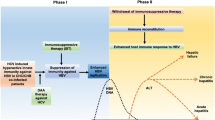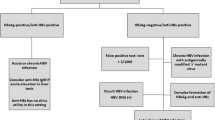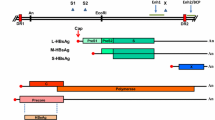Abstract
Spontaneous reactivation of the Hepatitis B virus (HBV) is rare in individuals with previously resolved infections. This report presents the case of a 71 year-old Japanese woman who experienced HBV reactivation without any prior immunosuppressive therapy or chemotherapy. Before the onset of liver injury, the patient was negative for hepatitis B surface antigen (HBsAg) but positive for hepatitis B surface antibody. She subsequently developed liver injury, with the reappearance of HBsAg and HBV DNA. The patient was successfully treated with tenofovir alafenamide, and prednisolone. Full-genome sequencing of HBV revealed subgenotype B1 without hepatitis B e-negative mutations in the precore and core promoter regions and 12 amino acid alterations in the pre-S1/S, P, and X genes. Notably, the S gene mutations D144A and K160N, which alter the antigenicity of HBsAg and potentially contribute to its reactivation, were identified. This case emphasizes the importance of vigilance for spontaneous reactivation of resolved HBV, highlighting the need for comprehensive genomic analysis to understand the associated virological intricacies.




Similar content being viewed by others
References
Collaborators GBDHB. Global, regional, and national burden of hepatitis B, 1990-2019: a systematic analysis for the global burden of disease study 2019. Lancet Gastroenterol Hepatol. 2022;7:796–829.
Seto WK, Lo YR, Pawlotsky JM, et al. Chronic hepatitis B virus infection. Lancet. 2018;392:2313–24.
Smalls DJ, Kiger RE, Norris LB, et al. Hepatitis B Virus reactivation: risk factors and current management strategies. Pharmacotherapy. 2019;39:1190–203.
Hoofnagle JH. Reactivation of hepatitis B. Hepatology. 2009;49:S156-65.
Myint A, Tong MJ, Beaven SW. Reactivation of hepatitis B virus: a review of clinical guidelines. Clin Liver Dis Hoboken. 2020;15:162–7.
Knoll A, Boehm S, Hahn J, et al. Reactivation of resolved hepatitis B virus infection after allogeneic haematopoietic stem cell transplantation. Bone Marrow Transpl. 2004;33:925–9.
Marusawa H, Imoto S, Ueda Y, et al. Reactivation of latently infected hepatitis B virus in a leukemia patient with antibodies to hepatitis B core antigen. J Gastroenterol. 2001;36:633–6.
Tong MJ, Sampliner RE, Govindarajan S, et al. Spontaneous reactivation of hepatitis B in Chinese patients with HBsAg-positive chronic active hepatitis. Hepatology. 1987;7:713–8.
Obara N, Inoue J, Endo H, et al. Spontaneous reactivation of hepatitis B virus with S gene mutations in an elderly patient with diabetic nephropathy. Clin J Gastroenterol. 2020;13:914–9.
Takakusagi S, Takagi H, Yokoyama Y, et al. Spontaneous reactivation of hepatitis B virus with a frameshift mutation in the precore region in an elderly hepatitis B virus carrier with lifestyle-related diseases. Clin J Gastroenterol. 2021;14:1202–10.
Kamitsukasa H, Iri M, Tanaka A, et al. Spontaneous reactivation of hepatitis B virus (HBV) infection in patients with resolved or occult HBV infection. J Med Virol. 2015;87:589–600.
Kim DH, Kim SB. Hepatic failure by spontaneous reactivation of hepatitis B Virus without a trigger factor in a patient with anti-HBs. Case Rep Gastroenterol. 2018;12:286–91.
Mulyanto Depamede SN, Surayah K, et al. Identification and characterization of novel hepatitis B virus subgenotype C10 in Nusa Tenggara. Indonesia Arch Virol. 2010;155:705–15.
Usuda S, Tsuda F, Gotanda T, et al. A solid-phase enzyme immunoassay for the common and subtypic determinants of hepatitis B surface antigen with monoclonal antibodies. J Immunol Methods. 1986;87:203–10.
Ohnuma H, Takai E, Machida A, et al. Synthetic oligopeptides bearing a common or subtypic determinant of hepatitis B surface antigen. J Immunol. 1990;145:2265–71.
Okamoto H, Omi S, Wang Y, et al. The loss of subtypic determinants in alleles, d/y or w/r, on hepatitis B surface antigen. Mol Immunol. 1989;26:197–205.
Beran A, Mhanna M, Haghbin H, et al. A case of hepatitis B virus reactivation triggered by acute Epstein-Barr virus infection. Cureus. 2021;3: e18676.
Pei R, Grund S, Verheyen J, et al. Spontaneous reactivation of hepatitis B virus replication in an HIV coinfected patient with isolated anti-hepatitis B core antibodies. Virol J. 2014;11:9.
Sagnelli C, Montella L, Grimaldi P, et al. COVID-19 as another trigger for HBV Reactivation: clinical case and review of literature. Pathogens. 2022;11:816.
Michalak TI, Pasquinelli C, Guilhot S, et al. Hepatitis B virus persistence after recovery from acute viral hepatitis. J Clin Invest. 1994;93:230–9.
Shi Y, Zheng M. Hepatitis B virus persistence and reactivation. BMJ. 2020;370:m2200.
Sakamoto K, Umemura T, Ito K, et al. Virological factors associated with the occurrence of hepatitis B virus (HBV) reactivation in patients with resolved HBV infection analyzed through ultradeep sequencing. J Infect Dis. 2020;221:400–7.
Kramvis A, Arakawa K, Yu MC, et al. Relationship of serological subtype, basic core promoter and precore mutations to genotypes/subgenotypes of hepatitis B virus. J Med Virol. 2008;80:27–46.
Lazarevic I, Banko A, Miljanovic D, et al. Immune-escape hepatitis B virus mutations associated with viral reactivation upon immunosuppression. Viruses. 2019;11:778.
Lada O, Benhamou Y, Poynard T, et al. Coexistence of hepatitis B surface antigen (HBs Ag) and anti-HBs antibodies in chronic hepatitis B virus carriers: influence of “a” determinant variants. J Virol. 2006;80:2968–75.
Purdy MA. Hepatitis B virus S gene escape mutants. Asian J Transfus Sci. 2007;1:62–70.
Lazarevic I. Clinical implications of hepatitis B virus mutations: recent advances. World J Gastroenterol. 2014;20:7653–64.
Wang J, Zhu B, Lu M, et al. Hepatitis B virus preS/S gene mutations and their clinical implications. Annals Blood. 2017;2:17.
Wu C, Zhang X, Tian Y, et al. Biological significance of amino acid substitutions in hepatitis B surface antigen (HBsAg) for glycosylation, secretion, antigenicity and immunogenicity of HBsAg and hepatitis B virus replication. J Gen Virol. 2010;91:483–92.
Inoue J, Nakamura T, Masamune A. Roles of hepatitis B virus mutations in the viral reactivation after immunosuppression therapies. Viruses. 2019;11:457.
Oon C, Lim G, Ye Z, et al. Molecular epidemiology of hepatitis B virus vaccine variants in Singapore. Vaccine. 1995;13:699–702.
Author information
Authors and Affiliations
Contributions
Conceptualization: Tokio Sasaki, Akio Miyasaka. Investigation: Masaharu Takahashi, Hiroaki Okamoto. Writing-original draft: Tokio Sasaki. Writing, review, and editing: Keisuke Kakisaka, Akio Miyasaka, Masao Nishiya, Naoki Yanagawa, Hidekatsu Kuroda, Takayuki Matsumoto, Masaharu Takahashi, and Hiroaki Okamoto. Approval of final manuscript: All authors.
Corresponding author
Ethics declarations
Conflict of interest
All the authors declare that they have no conflict of interest.
Human rights
All the procedures were performed in accordance with the ethical standards of the 1964 Declaration of Helsinki and its later amendments.
Informed consent
Informed consent was obtained from the patient to publish the clinical and virological findings.
Additional information
Publisher's Note
Springer Nature remains neutral with regard to jurisdictional claims in published maps and institutional affiliations.
Supplementary Information
Below is the link to the electronic supplementary material.
Rights and permissions
Springer Nature or its licensor (e.g. a society or other partner) holds exclusive rights to this article under a publishing agreement with the author(s) or other rightsholder(s); author self-archiving of the accepted manuscript version of this article is solely governed by the terms of such publishing agreement and applicable law.
About this article
Cite this article
Sasaki, T., Kakisaka, K., Miyasaka, A. et al. Spontaneous reactivation of hepatitis B virus with multiple novel mutations in an elderly patient with resolved hepatitis B virus infection. Clin J Gastroenterol (2024). https://doi.org/10.1007/s12328-024-01984-1
Received:
Accepted:
Published:
DOI: https://doi.org/10.1007/s12328-024-01984-1




